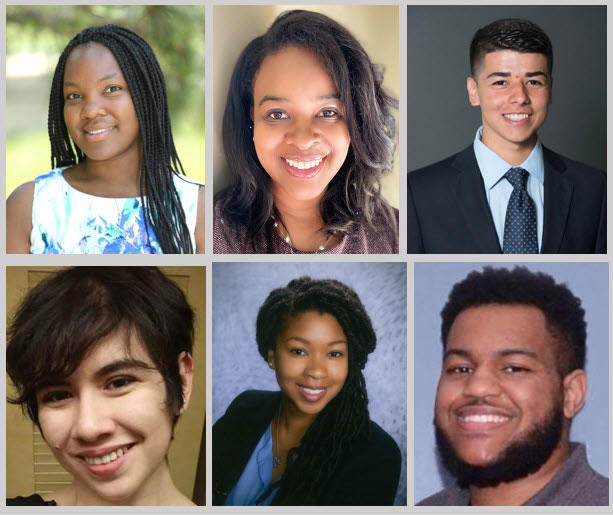2020 iCURE Scholars Join DCEG
, by DCEG Staff
The NCI Intramural Continuing Umbrella of Research Experiences (iCURE) program offers mentored research experiences to qualified individuals seeking postbaccalaureate, graduate, or postdoctoral fellowships. iCURE aims to support the career progress of its scholars toward research independence, as well as foster and sustain diversity in the biomedical research pipeline. Eligible participants receive funding to complete research opportunities in DCEG or the Center for Cancer Research, for one to three years.
This year, DCEG welcomed six new iCURE scholars:
Francine S. Baker, B.S., joined the Laboratory of Translational Genomics (LTG) as a postbaccalaureate fellow. Ms. Baker graduated from the University of Maryland, College Park, School of Public Health in December 2017 with a degree in public health science. Following her undergraduate study, she completed a year as an NIH Academy Enrichment Program postbaccalaureate fellow in the laboratory of Dr. Stefan Ambs in the NCI Center for Cancer Research, where she investigated the role of cysteine metabolism on breast cancer biology. Currently, Ms. Baker is pursuing a master’s degree in biology with a concentration in cancer prevention and control from the University of the District of Columbia. She is being mentored by Ludmila Prokunina-Olsson, Ph.D., Chief of LTG and Sam Mbulaiteye, M.B.Ch.B., M.Phil., M.Med, senior investigator in the Infections and Immunoepidemiology Branch, to explore the connection between Epstein Barr virus infection and IFNL4, and its relation to health disparities.
Lesley Chapman, Ph.D., joined DCEG as a postdoctoral fellow under the mentorship of Douglas Stewart, M.D., in the Clinical Genetics Branch and Hormuzd A. Katki, Ph.D., in the Biostatistics Branch (BB). She received her Ph.D. in translational biomedical science from the University of Rochester Medical Center. Before joining the NCI, she completed a National Research Council postdoctoral fellowship at the National Institute of Standards and Technology (NIST) where she developed a crowdsourcing app to characterize germline structural variants within the human genome and implemented machine learning strategies to create a benchmark set of structural variants. Dr. Chapman is currently completing a master’s degree in statistics at American University. In DCEG, she will develop machine learning and statistical strategies to identify novel pathogenic variants in pediatric cancer.
Frank J. Colón-Matos, B.S., joined DCEG as a postbaccalaureate fellow under the mentorship of Maria Teresa Landi, M.D., Ph.D., senior investigator in the Integrative Tumor Epidemiology Branch. He is working on the Sherlock-Lung study, a genomic epidemiologic study of lung cancer in never smokers, collecting and analyzing epidemiological and clinical data as well as participating in the design and implementation of pathology-related work. Prior to joining DCEG, Mr. Colón-Matos worked as an undergraduate fellow in the Inter American University of Puerto Rico and as a summer fellow in the Feinberg School of Medicine Northwestern University.
Danielle A. Duarte, B.S., joined DCEG as a postbaccalaureate fellow under the mentorship of Rena Jones, Ph.D., M.S., tenure-track investigator, and Mary H. Ward, Ph.D., senior investigator in the Occupational and Environmental Epidemiology Branch (OEEB). Ms. Duarte graduated from the University of New Mexico in May 2018 with dual degrees in biology and psychology. Following her undergraduate study, she completed two years as an NIH Undergraduate Scholar Program postbaccalaureate fellow in the National Institute on Minority Health and Health Disparities, where she investigated relationships between social determinants and tobacco use. In OEEB, she is evaluating cancer risks associated with industrial air pollutants and residential exposure to agricultural pesticides.
Cherrel Manley, M.S.P.H., joined OEEB as a postbaccalaureate fellow under the mentorship of Drs. Ward and Jones. Ms. Manley received her M.S.P.H. in epidemiology from the University of North Carolina at Chapel Hill, where she studied prenatal exposure to organophosphorus pesticides and preschool ADHD in the Norwegian Mother, Father and Child Cohort. She is studying residential and drinking water exposures and cancer risk in the Agricultural Health Study.
Corey Young, M.S., joined BB as a predoctoral fellow under the mentorship of Dr. Katki. Mr. Young received his B.S. and M.S. degrees in biology at North Carolina Agricultural and Technical State University. Currently, at Morehouse School of Medicine, he studies the role of a chemokine CXCL13 and its lone receptor CXCR5 in the progression and initiation of non-small cell lung cancer. In DCEG, Mr. Young is developing new lung cancer risk models and studying their use to reduce health disparities in lung cancer screening.
Review information on the iCURE application cycle.
